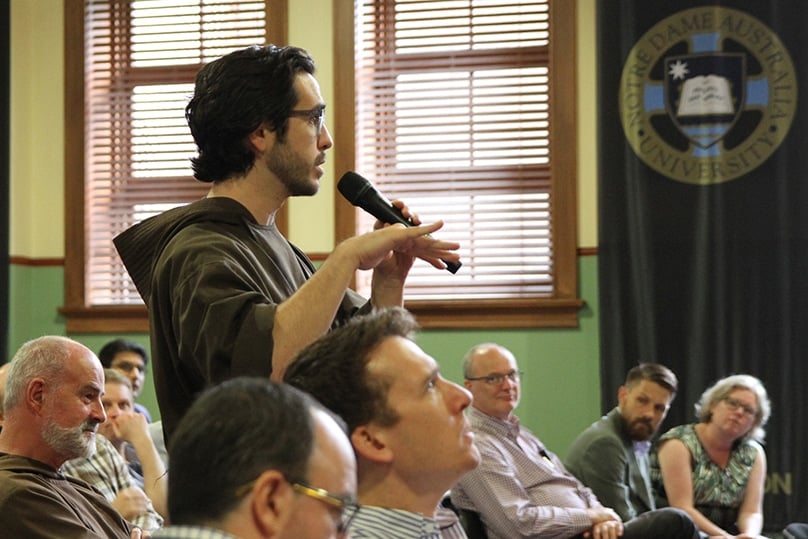
Theologians ranged through topics as diverse as Rosemary’s Baby, the heat death of the universe, whether we will be male and female in heaven and Dante’s Inferno at the fifth instalment of the growing Theology at the Beginning of the Third Millennium conference series at the University of Notre Dame Australia.
This instalment of the popular conference series saw 40 papers delivered on 9-10 February on the theme of eschatology, traditionally the four last things: death, judgment, heaven and hell.
A collection of papers from the previous instalment, on pneumatology (the study of the Holy Spirit) was launched on 8 February by Archbishop Anthony Fisher OP to open this year’s proceedings.
In addition to a frenetic schedule, attendees enjoyed three keynote papers by Professor Tracey Rowland of the University of Notre Dame Australia, Dr Bernard Doherty of St Mark’s National Theological Centre, and Dr Michael Burdett of the University of Nottingham.
Professor Rowland developed insights of Cardinal Joseph Ratzinger (later Pope Benedict XVI) about eschatology, utopia and deification—the dynamic by which human beings are drawn into the life of God by grace.
Dr Doherty illustrated how the figure of the antichrist looms large in the “little tradition” of unofficial Catholic theology, popular culture and fringe conspiracy theories, especially online.
And Dr Burdett of the University of Nottingham put theology into dialogue with transhumanist responses to scientific accounts of the end of the cosmos, like the heat death of the universe, the “big crunch” and “big bounce” theories.
Other papers at the conference explored the relationship between punishment and justice, the church’s teaching on the fate of unbaptised children, purgatory, Millenarianism, the nature of time, and different conceptions of heaven throughout Christian history.
Australian Catholic Theological Association Vice-President Dr Joel Hodge, who delivered a paper on the eschatology of the French polymath Rene Girard, said the growth of the Third Millennium series was “really healthy.”
“The niche it’s filling is it’s helping to focus on particular topics within theology, and then open those topics up to theologians but also non-theological experts,” he said.
The series has a deep sense of the tradition, but is not afraid of engaging the contemporary situation, he said.
Australian Catholic University theologian Antonia Pizzey, who travelled to Sydney from Brisbane for the conference, said eschatology was a vital topic with important pastoral applications.
“It’s an area that impacts people’s lives. Everyone goes through an experience of losing somebody we love,” she said.
“Questions of eschatology are the questions of, ‘How do we deal with that loss? What hope do we have? What hope do we have as human beings in the love of God?’
“Those are eschatological questions and they need attention. It’s wonderful this conference is here so we can talk about it.”
The conference was co-convened by UNDA’s Professor Tracey Rowland, Dr Kevin Wagner and Christian Stephens, and the Catholic Institute of Sydney’s Professor Isabell Naumann ISSM and Dr Peter McGregor.
Dr McGregor said the convenors were “very pleased” with the number and quality of papers, and the spirit of the conference.
“We’ve had people from more diverse backgrounds, from overseas, so there’s been a great diversity in the papers delivered,” he said.
“The ones I’ve gone to, I haven’t been disappointed with anything. What I look for in a conference is I want to learn—I certainly have learned a lot here.”
In his opening address to launch the conference and latest book in the Third Millennium series, Archbishop Fisher said he had worked with many of the theologians in attendance for decades.
“The abundance of theological fruit that has ripened over the last eight years [since the conference series began] has been the product of collaboration, friendship and, most importantly, faith,” he said.
